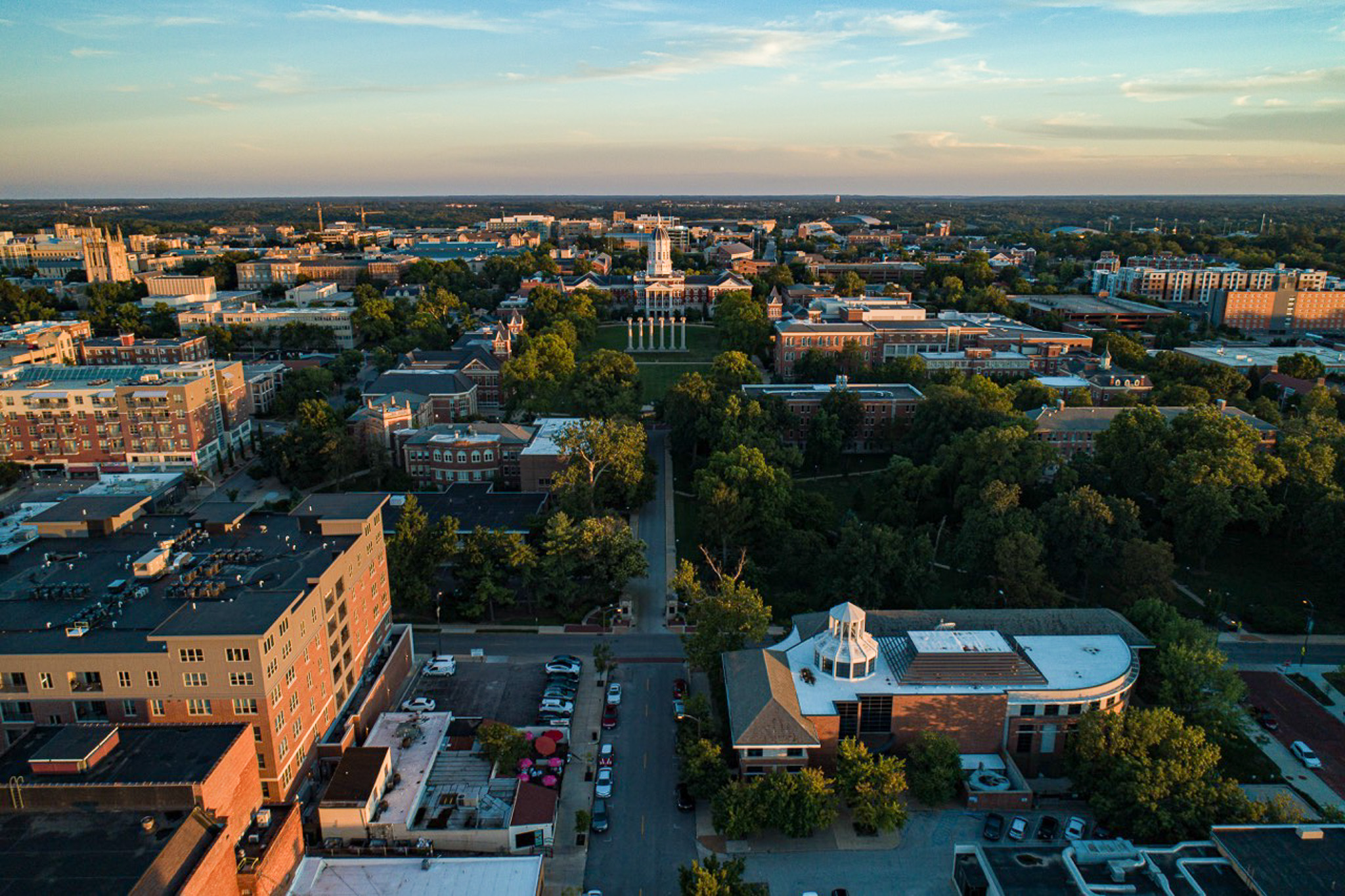Who We Are
The Social Impact Lab is a dynamic, multidisciplinary research community dedicated to turning innovative ideas into rigorous research that improves population health and well-being. Our research frequently utilizes policy and population-level datasets, quasi-experimental study designs, and advanced statistical methods to produce causal insights that inform decision-making and policy development. Our efforts are guided by commitments to open dialogue, rigor, integrity, ingenuity, and knowledge-sharing. The lab includes a well-resourced research team housed at the University of Missouri, as well as a national affiliate program. The lab is funded by the University of Missouri.

Research Cores
The lab is structured into three core areas—Economics, Law & Policy, and Public Health—each of which supports independent research while contributing expertise across cores to foster collaboration, enhance research outputs, and broaden impact.
The Economics Core primarily uses observational data and natural experiments to identify causal parameters of relationships that can ultimately improve population health and wellbeing.
The Public Health Core studies how policies, systems, and environments impact health and well-being by drawing upon diverse methodologies. The Core curates a wide array of datasets, synthesizes evidence for dissemination, and conducts research that enriches insights into complex issues.
The Law & Policy Core studies how policies and laws impact health and well-being through legal mapping, policy surveillance, legal epidemiology, and other related methods.
Our Approach
Evidence Generation
At the core of our work is a commitment to rigorous, evidence-based research. Lab-supported research prioritizes quality over speed or volume. We strive to produce research on timely and under-explored topics, and encourage exploration of high-risk, high-reward questions that are often under-incentivized but hold the potential for transformative impact.
Facilitating Collaboration, Community, and Network
The Lab brings together a community of researchers from a variety of disciplines that are united by a shared interest in social and population impacts. A hallmark of the lab is a structured discussion series to sharpen early-stage research ideas. The lab fosters an atmosphere of respect and mutual support through a code of conduct that emphasizes research best practices and safeguarding research contributions. Each core—Economics, Law & Policy, and Public Health—offers core specific programming to meet unique needs of different affiliates.
Sharing Research
We believe in the power of knowledge-sharing to catalyze change. Our Lab is committed to disseminating research findings, fostering dialogue, and engaging with diverse audiences, including policymakers, practitioners, and the public. By doing so, we aim to inform and inspire evidence-based decision-making and policy development. We make our research, databases and resources publicly accessible to demystify our research for the public and to empower the broader research community to build upon our work.
Stay in the Know
Be part of the Social Impact Lab! Stay informed about our research, events, and opportunities or take the next step to collaborate with us.
Lab Products
As a newly established lab (founded spring 2025), we are dedicated to building a strong foundation for impactful research. Our focus on transparency, innovation, and collaboration positions us to rapidly establish credibility through the achievements of our employees and affiliates. By joining now, you have the unique opportunity to help shape this dynamic community and contribute to its growth from the very beginning.
We study the effects of cigarette excise taxes on smokers’ household budgets. In a randomized survey experiment, smokers respond to tax increases by adjusting cigarette shopping behaviors, substituting towards other tobacco products, and reducing both discretionary and human capital-related expenditures. Using Consumer Expenditure Survey data and a quasi-experimental design, we find cigarette taxes reduce smoking prevalence but increase cigarette expenditures among continuing smokers. Additionally, a $1 increase in cigarette taxes causes a 2.12% decline in human capital-related expenditures among below median income smokers. Our work uncovers important unintended consequences of cigarette taxes, particularly for low-income individuals.
This study evaluates drug regulation in the United States by examining a product that was unexpectedly judicially exempted from drug regulation in 2010: e-cigarettes. We compare these effects to nicotine replacement therapy, which was not exempted. Our analysis shows that this exemption led to significant increases in e-cigarette innovation, as evidenced by patent applications. Leveraging differences in smoking rates across demographic groups prior to e-cigarette introduction, we find that from 2011 to 2019, e-cigarettes saved 677,000 life-years, or approximately 1/3 the estimated benefit of early HIV/AIDS drugs through year 2000, and increased social surplus by $8 billion annually. We demonstrate that reduced smoking is a key mechanism explaining this mortality reduction, with statistically significant smoking reductions proceeding mortality reductions by approximately 4 years.
We examine the impact of Automation on workers™ health risks. We first document that automation leads to a divergence in the severity of occupational health risks: while automation reduces nonfatal occupational injury incidence, it increases fatal injury incidence. Secondly, the disparity of health risks across age groups has widened due to automation. The overall hospitalizations have declined in commuting zones with higher automation exposure. Yet, the benefits are concentrated among young workers, while middle-aged workers experience increased hospitalizations, particularly due to despair-related conditions. Combining the occupational injury estimates, a back-of-the-envelope calculation suggests that workplace automation provides significant, health-driven economic benefits.
Cigarette smoking, a leading cause of preventable death in the United States, rose to widespread popularity in the early 20th century. Between 1893 and 1921, sixteen states enacted laws prohibiting the sale of cigarettes, but all such bans were repealed by 1927. We examine the impact of these repeals using data from the U.S. Veterans Mortality (Dorn) Study, collected in the 1950s, which allows for a retrospective analysis of early cigarette use. Using a staggered adoption difference-in-differences design, we find that repealing cigarette bans increased smoking initiation before ages 20 and 25 by over 13%. We also show that the distribution of cigarettes to soldiers during World War I increased smoking uptake and later-life mortality among men from states with active bans at the time of enlistment. Taken together, our findings suggest that the abandonment of early efforts to restrict cigarettes had long-lasting consequences for health.
The rise of nicotine vaping products (NVPs) has led governments to consider banning or limiting flavored NVP sales to reduce their appeal. In particular, we study the effect of NVP flavor restrictions enacted in Canada, a country with historically high tobacco regulation, through July of 2023. Using a stacked DID model, we estimate that flavor restrictions increased cigarette sales by 9.6%. In gas and convenience stores, these restrictions nearly eliminated flavored non-menthol and menthol NVP sales while increasing tobacco and unflavored NVP sales by 123.4%. Substitution patterns arise in Canada despite its strict tobacco control environment, suggesting that patterns of substitution between e-cigarettes and cigarettes are generalizable across countries with different tobacco regulatory strengths.
Governments worldwide have recently considered and adopted policies limiting nicotine content in tobacco products, yet little is known about these policies’ impacts on tobacco product consumption. This paper estimates the effect of Canada’s limits on nicotine in e-cigarettes using a difference-in-differences design. We find evidence of a 37% decrease in sales of e-cigarette products in gas and convenience stores. However, we also estimate an 18% increase in Google Searches for e-cigarettes and a 34% increase in Google Searches containing the phrase “Vape Shop”, suggesting substitution to online outlets, vape shops, and potentially illicit markets. We find no evidence of an effect on cigarette sales and can rule out effects larger than a 3% increase with 95% confidence.
As of 2025, 18 states (including Washington D.C.), 17 cities, and four counties have paid sick leave mandates that allow workers to use paid time off for healthcare utilization. Some groups have argued that paid sick leave mandates could reduce healthcare spending overall by increasing use of preventive care and reducing incidences of infectious disease. We evaluate these claims by studying the effect of paid sick leave mandates on private insurance and Medicaid spending data from the Centers for Medicare and Medicaid Services National Health Expenditure accounts, and household spending data from the Bureau of Labor Statistics. We find evidence that paid sick leave mandates significantly increase per-capita private insurance and Medicaid spending as well as out-of-pocket spending on prescription drugs. We find a 7.5% increase in per-capita private health insurance spending overall and a 13% increase in total Medicaid spending. Additionally, we find a 24% increase in prescription drug spending among households most likely to newly gain paid sick leave. We conclude that paid sick leave mandates are unlikely to reduce healthcare spending, at least in the short term.
E-cigarette tax scheme vary across states and localities, making comparisons across states difficult. This project provides standardized e-cigarette tax rates at the state and local levels in the United States. The indoor air laws database reports US national- and state-level estimates of population coverage of comprehensive and partial indoor smoking restrictions from 1990 to 2021 for bars, restaurants, and workplaces, and comprehensive indoor vaping restrictions from 2006 to 2021 for the same locations. The flavored tobacco product sales restrictions longitudinal dataset describes state and national population coverage and comprehensiveness of flavored tobacco sales from 2010 to 2023 for e-cigarettes, cigarettes, cigars, and smokeless tobacco.
Hearing loss is estimated to affect nearly a quarter of the U.S. adult population. Although hearing aids are an efficacious treatment, only about 25 percent of individuals with moderate-to-severe hearing loss use them, with cost frequently cited as a barrier to access. Currently, twenty-eight states offer some form of Medicaid coverage for hearing aids, and twenty-six states mandate that fully-insured private insurance plans provide such coverage. In this paper, we study how Medicaid and private insurance coverage for hearing aids affected usage, and whether increased usage led to improvements in downstream health and social outcomes.
In our current study, we propose to estimate downstream effects of hearing aid mandates for working-age adults on health, human capital, and public benefit receipt outcomes. To do so we rely on a natural experiment: variation in adoption and timing of private insurance and Medicaid mandates for hearing aid coverage. We will estimate a series of two-way fixed effects and event study models to compare outcomes among US adults ages 25–64 living in states with and without hearing aid coverage before and after the policy adoption. We hypothesize that the adoption of hearing aid coverage mandates at the state-level will improve self-reported health and downstream life satisfaction and economic security outcomes.
TOPS is a free multidisciplinary, international forum for research with tobacco policy implications using experimental or quasi-experimental study designs (i.e., with a well-defined counterfactual). TOPS strives to be a respectful, inclusive, and diverse forum, with participants and attendees united around the concept of presenting and learning from tobacco research using study designs capable of producing results with a causal interpretation, with the ultimate goal being the production and sharing of knowledge to develop an effective tobacco policy framework for improving population health. This forum is designed to bring together academics, students, government employees, policy researchers, healthcare professionals, advocates, and funders, with the goal of breaking silos in tobacco policy research and providing a platform for high-quality research to be discussed and disseminated.
Our Leadership
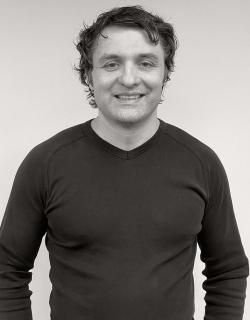
- Position:
Director and Economics Core Lead - People Profile
- Favorite band / musician:
The Killers - Secret superpower:
Reformer pilates

- Position:
Associate Director - People Profile
- Favorite band / musician:
Soundgarden - Secret superpower:
I am Batman
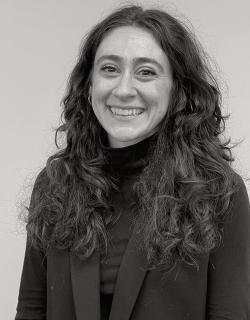
- Position:
Law and Policy Core Lead - People Profile
- Favorite band / musician:
Taylor Swift (In My Fearless Era) - Secret superpower:
Breaking the ice on a dance floor

- Position:
Public Health Core Lead - People Profile
- Favorite band / musician:
Jonathan Larson (Rent) and Jason Robert Brown (Songs for a New World) - Secret superpower:
Incorporating rainbow and blacklight into everyday life
Our Team
The lab employs research professionals, post-docs, and graduate students. The culture is more start-up than ivory tower. Lab employees are committed to rolling up their sleeves and doing the hard work of expanding the frontiers of science, and they generally have fun while doing it. They actively consider how the lab’s research can transcend academic silos and make an impact in other fields. Employees also serve as lab affiliates.
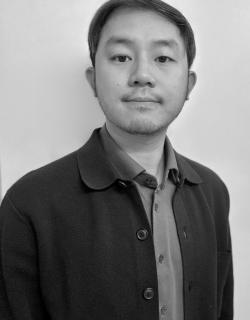
Position:
Research Program Manager
Website:
economics.missouri.edu/people/wilson-nham
Favorite band / musician:
Most K-pop (Rosé) and C-pop (Eason Chan)
Secret superpower:
Finding joy in meaningful work
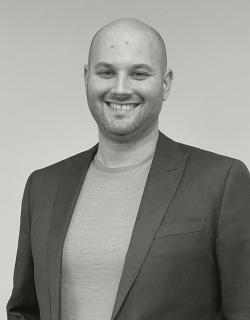
Position:
Data Scientist
Website:
austinlandini.com
Favorite band / musician:
Big Head Todd and the Monsters
Secret superpower:
Planning cheap vacations
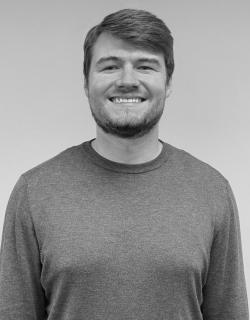
Position:
Post-Doctoral Scholar
Website:
braddaviseconomics.com
Favorite band / musician:
Bob Dylan
Secret superpower:
Knowing every coffee shop in town

Position:
Post-Doctoral Scholar
Website:
rachelylfung.com
Favorite band / musician:
Panic! At The Disco
Secret superpower:
Wordplay
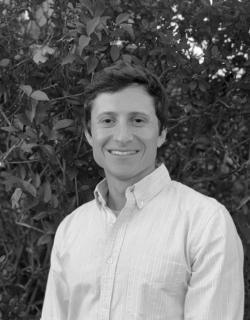
Position:
Post-Doctoral Scholar
Website:
christopherlowenstein.com
Favorite band / musician:
The Roots
Secret superpower:
Napping in any location and position

Position:
Graduate Research Assistant
Website:
sites.google.com/view/guthriescoblic
Favorite band / musician:
Led Zeppelin
Secret superpower:
Avoiding sidewalk cracks
Our Affiliates and Advisors
Researchers affiliated with the lab come from a variety of disciplines and are united by a shared interest in the lab’s mission of improving population health and wellbeing. They participate in the lab’s structured early-stage research discussion series and follow a code of conduct that emphasizes research best practices and safeguarding research contributions.
Elena Andreyeva: Texas A&M University
Jim Flynn: Miami University
Amanda (Mandy) Gaulke: Kansas State University
Reginald Hebert: Yale University
Lauren Hoehn-Velasco: Georgia State University
Lynn Hua: Georgia State University
Jayani Jayawardhana: University of Kentucky
Anna Jilla: University of Louisiana at Lafayette
Cory Koedel: University of Missouri
Seunghoon Lee: University of Missouri
Sezen Ozcan Onal: SUNY Downstate Health Sciences University
Christian Saenz: Georgia State University
Sam Sturm: Johns Hopkins University
Keith Teltser: Georgia State University
Benjamin Ukert: Texas A&M University
Justin White: Boston University
W. David Bradford: University of Georgia
Scott Burris: Temple University
Nicholas Christakis: Yale University
Abigail Friedman: Yale University
David Slusky: University of Kansas
Affiliates enjoy a range of opportunities to engage with the lab’s dynamic, multidisciplinary environment. While some individuals have access to such intellectually vibrant settings through their home institutions, many otherwise outstanding researchers at smaller schools and departments do not. This lab is designed to recreate that environment—fostering rigorous idea exchange, methodological refinement, and the sharpening of research through regular interaction and thoughtful feedback.
Specific benefits include:
- Participation in the Idea Development, Enhancement and Assessment (IDEA) Workshop Series: This workshop series provides a rare, structured opportunity to refine early-stage ideas with diverse, multidisciplinary feedback. It is designed to efficiently and thoroughly vet research ideas in their early stages, helping to maximize their potential, increase rigor, and improve impact.
- Networking: Join a supportive national network of researchers dedicated to the lab’s mission and principles. This network can help affiliates build multidisciplinary teams for grant applications, facilitate comparatively advantageous co-author matching (e.g., help match senior researchers with junior researchers), help junior faculty identify tenure letter writers, and enhance post-doc and faculty recruitment efforts, among other opportunities.
- Upskilling and Resource Sharing: Access resources such as occasional seed grant opportunities, research infrastructure for lab-supported projects (e.g., high-performance computing; database creation), a lab Slack discussion channel, and grant-writing resources.
- Collaborative Opportunities: Affiliates have the chance (though no obligation) to co-author lab-supported papers with other affiliates. These papers adhere to strict ethical standards designed to minimize the potential for co-authorship conflicts.
- Reputation: Affiliates are selectively admitted, and lab-supported papers, guided by our Community Standards and Principles of Conduct guidelines, carry a mark of research quality.
Whether you are a senior or early-career researcher, the lab offers resources and a supportive network to help you (or your own lab’s) research and achieve your goals.
The Social Impact Lab welcomes applications from individuals whose research aligns with our mission of improving population health and wellbeing. We encourage applicants from all career stages, diverse disciplines, and a wide range of content expertise (e.g., health, environment, crime, etc.). Affiliates are typically professionals with terminal research degrees, such as PhDs or MDs, who are actively engaged in research. A limited number of students in the final stages of their terminal research degrees may also join as student affiliates.
IDEA workshops are virtual, 90-minute, small-group sessions designed to help affiliates efficiently refine early-stage ideas—such as research papers or grant applications—and decide which to pursue or set aside. Each presenter briefly shares an intentionally “bad research idea”—one that seeks to address a question the researcher feels is important but is either underdeveloped or has significant limitations. Participants provide rapid, constructive feedback, fostering a collaborative environment that values missteps as essential steps in the creative process. Presenters gain insights into general interest, potential improvements, and collaboration opportunities. The workshops are guided by clear procedures and guidelines to ensure participants feel safe sharing ideas without fear of judgment or being scooped.
These workshops are valuable for various types of researchers, including those with limited research time who need to prioritize high-impact projects, those lacking opportunities to discuss early-stage research, and those aiming to enhance the impact of their work through better project selection.
For example, an economist might present an idea exploring the impact of community college access and industry partnerships on health outcomes. The economist may be thinking of this idea as both a potential paper and grant application. During their four-minute presentation, the economist might describe trends in the literature and raise questions about whether their idea makes a strong enough contribution. They could also outline initial data they’ve identified, highlighting its limitations. Each audience member will then have one minute to provide rapid feedback, which is expected to vary considerably in terms of content covered and helpfulness.
Feedback could include:
- Knee-jerk reactions on the feasibility and potential of the research question, including whether it fills a critical knowledge gap or aligns with societal priorities.
- Suggestions for alternative/additional framing, data sources, or policy variations to enhance the study’s impact and rigor.
- Identification of related work, such as ongoing research or recently published studies relevant to the topic that the researcher did not mention in their overview. In some cases, another affiliate may be working on similar research, leading to follow-up discussions and potential collaboration.
- Discussion of unintended consequences of the proposed intervention or policy, offering new angles to strengthen the research question.
- Exploration of equity considerations, such as whether the research adequately addresses disparities among different populations and how these aspects could be incorporated.
- Awareness of potential collaborators, such as NGOs interested in the question, who may provide data access or serve as valuable dissemination partners.
- Suggestions on funders and how to package the idea for them.
By the end of the workshop, the researcher would leave with actionable insights to refine their project, broaden its scope, or decide whether to set it aside.
Further information can be found in procedures and guidelines.
We recognize that researchers have varying levels of availability, and the lab is designed to accommodate both those with tight schedules and those who wish to engage more actively. The minimum time commitment is participation in a quarterly 90-minute IDEA workshop, structured to efficiently refine early-stage research ideas while maximizing feedback. Beyond this, affiliates may contribute in additional ways as well, such as sharing expertise over Slack, authoring lab-supported papers, or participating in other lab activities, but these activities are not expected or required.
See Application to apply.
Applications are reviewed on a rolling basis by lab leadership, with selection based on factors such as skillset and the need to build a complementary team that enhances research discussions and advances the lab’s mission. While many qualified individuals apply, some may not be selected due to external considerations. The Social Impact Lab upholds a strict non-discrimination policy in its affiliate admissions decisions and prohibits any form of harassment or discrimination in lab activities.
Affiliates may remain active in the lab for as long as they wish and can leave at any time. Annual reviews are conducted to ensure continued engagement with lab activities and adherence to Community Standards and Principles of Conduct.
All research affiliates are required to abide by the lab’s Community Standards and Principles of Conduct guidelines (see here), fostering a respectful, inclusive, and collaborative environment.
Become Affiliated
Connect with Us
Email: socialimpactlab@missouri.edu
